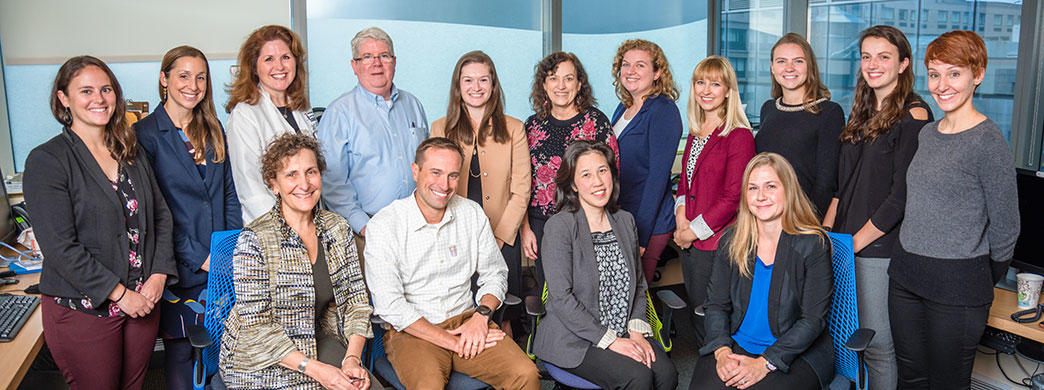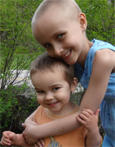Pediatric Cancer Genetic Risk Program

The Pediatric Cancer Genetic Risk Program at Dana-Farber/Boston Children's provides cancer risk assessment for children, comprehensive recommendations for managing cancer risk in children, and psychosocial support for families affected by hereditary cancer. We also conduct research into many aspects of cancer risk and its management. We are one of the few cancer genetic risk programs in the U.S. focused specifically on pediatric cancer risk.
Our goal is to help you determine whether your children are at risk of cancer – and if so, what can be done either to help prevent cancer in your children or to catch it early and address it quickly for the best possible outcome.
How Our Program Works
We help you manage all aspects of genetic cancer risk – from consideration of testing to monitoring to counseling. A visit to our program usually includes time with both a physician and a genetic counselor, both of whom have expertise in inherited cancer syndromes that affect children. We are also one of the few programs of this type that includes a pediatric psychologist who specializes in pediatric hereditary cancer. This specialized consultation is a standard part of clinic visits offered to each family.
Our Pediatric Cancer Genetic Risk Program:
- Helps parents decide whether to undertake genetic testing of their children and if so, when the best timing for it might be
- Provides genetic and genomic testing to determine risk for inherited cancer syndromes
- Helps families understand the implications of the genetic/genomic test results for the child and other relatives
- Designs individualized programs to monitor for the earliest signs of cancer and to reduce the risks of cancer when appropriate; we help identify the right specialists to see for monitoring and how often you should see them
- Talks with children to help them understand genetic testing and what the results might mean for them
- Guides parents in how to talk to children about hereditary cancer, including when to talk with them and what information to provide
- Helps families cope with the stress of a hereditary cancer diagnosis
We also provide consultation to community-based providers who may be unfamiliar with the unique medical and psychosocial issues that arise when a family receives a hereditary cancer diagnosis.
If you or your doctor believe your child might have an inherited form of cancer or be at increased risk for developing cancer – or if you are considering having children and want to better understand the possible risk for your children – you may wish to schedule an appointment with us.
Our program is recommended for children who have:
- A diagnosis or prior treatment for a rare childhood cancer or brain tumor
- A diagnosis or prior treatment for a cancer of any type plus a family history of cancer
- A strong family history of cancer
- A parent (or another relative) known to have a cancer syndrome or a cancer gene mutation
The field of genetics is rapidly changing, and we provide advanced options in genetic testing across the spectrum of new and established inherited cancer syndromes. The syndromes include but are not limited to:
- DICER1 syndrome
- Hereditary retinoblastoma
- Li-Fraumeni syndrome
- Multiple endocrine neoplasia
- Paraganglioma/pheochromocytoma syndrome
- Von Hippel-Lindau syndrome
- PTEN hamartoma syndrome, including Cowden syndrome
- Polyposis syndromes, including familial adenomatous polyposis and juvenile polyposis
- Hereditary leiomyomatosis and renal cell cancer (HLRCC)
- Familial neuroblastoma (ALK)
- Congenital central hypoventilation syndrome (CCHS)
- RASopathies
- Congenital mismatch repair deficiency (CMMRD) or biallelic mismatch repair deficiency (BMMRD)
- Gorlin syndrome
- Rhabdoid tumor predisposition syndrome (RTPS)
Although our Pediatric Cancer Genetic Risk Program is focused on pediatric cancer risk, adult family members may choose to visit Dana-Farber Cancer Institute's Cancer Genetics and Prevention Clinic. Both programs work closely together, allowing us to provide integrated care for families.
Our team includes pediatric oncologists, genetic counselors, psychologists, and other specialists from Dana-Farber/Boston Children’s Cancer and Blood Disorders Center, the Division of Cancer Genetics and Prevention at Dana-Farber Cancer Institute, and the Division of Genetics and Genomics at Boston Children's Hospital.
The core clinical team at Dana-Farber/Boston Children’s includes:
- Lisa Diller, MD, co-director and pediatric oncology institute physician
- Junne Kamihara, MD, PhD, co-director and pediatric oncology physician
- Brian Crompton, MD, pediatric oncology physician
- Jill Brace O'Neill, MS, PPCNP-BC, pediatric nurse practitioner, Dana-Farber Cancer Institute
- Andrea Deleault Onufrychuk, APRN, MSN, FNP-BC, CBS
- Kayla Hamilton, MS, CGC
- Jaclyn Schienda, ScM, CGC, lead genetic counselor
- Katelyn Breen, MS, CGC
- Gwen Muscato, MS, CGC
- Abigail Ward, MS, CGC
- Corinne Echmalian, MS, LCGC
- Cecilia Miguel, MS, LCGC
- Joan Hanania, PhD
Most case are reviewed by a larger multidisciplinary team composed of genetic counselors, geneticists, pediatric specialists, psychologists, and oncologists from Dana-Farber Cancer Institute and Boston Children’s Hospital. This larger team also forms the basis of expert referrals as needed and includes the following specialists:
- Judy Garber, MD, MPH, Director, Division of Cancer Genetics and Prevention, Dana-Farber Cancer Institute
- Huma Rana, MD, Clinical Director, Division of Cancer Genetics and Prevention, Dana-Farber Cancer Institute
- Stephanie (Newton) Coury, MS, CGC, genetic counselor, Boston Children’s Hospital
- Victor Fox, MD, Director, Pediatric Polyposis Program, Boston Children's Hospital
- Pamela Hawley, MS, CGC, genetic counselor, Boston Children’s Hospital
- David Miller, MD, PhD, geneticist, Boston Children’s Hospital
- Wen-Hann Tan, BMBS, geneticist, Boston Children’s Hospital
In recent years, researchers have made great strides in building our understanding of how genetic factors influence cancer risk – and how we can leverage new technologies for testing and screening. Our comprehensive Pediatric Cancer Genetic Risk Program includes not only the clinical care of children with cancer but incorporates research at the forefront of genetic discovery.
Some of our research interests include:
- Multiplex sequencing to identify hereditary cancer risk in pediatric cancer patients
- Screening with whole body MRI for detection of primary tumors in children and adults with Li-Fraumeni syndrome (LFS)
- Hereditary risk factors for thyroid cancer
- Support for pediatric patients and families at risk of hereditary cancer
We offer appointments Monday-Friday. We will work with your insurance company to obtain coverage; in most cases, insurance companies will provide coverage.
Phone: 1-888-733-4662
Fax: 617-751-7046
Email: pedi_genetics@dfci.harvard.edu
Mailing address:
450 Brookline Avenue
Shields Warren Building, Rm. SW430
Boston, MA 02215
International patients
Email pedi_international@dfci.harvard.edu, call +1 617-355-5209, or visit our International Patient Services web section to learn more about our specialized services for international patients.

 Translate
Translate 
